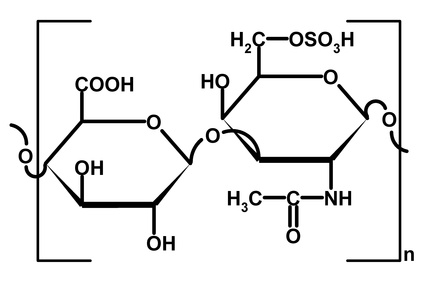Contents
Chondroitin Products for Arthritis
Chondroitin is an amino sugar, which is produced within cartilage cells. It is one of the basic substances of articular cartilage, the type of cartilage found within joints. For this reason, there is great interest in chondroitin sulfate as a dietary supplement for patients with osteoarthritis. It stabilises the cartilage and helps to counteract the external pressure on the articular cartilage.
Because it is formed by the human body itself, chondroitin is considered to be well tolerated and free from side effects. The results of several clinical studies have shown a positive effect on the symptoms of arthritis and other rheumatic complaints.
Chondroitin sulfate is available on the market in tablet form and is to be preferred over chondroitin hydrochloride.
Chondroitin is a substance that occurs naturally in joints. Studies have shown the anti-inflammatory and cartilage-building effect of glucosamine. Like most food supplements, which act on the physiological level, chondroitin takes from two to six months to have a noticeable effect.
It’s effectiveness can be significantly enhanced by combining it with glucosamine and Omega-3. Side effects are not anticipated with either chondroitin, glucosamine or omega-3 fatty acids. Chondroitin thus belongs to a group of natural treatments for osteoarthritis and arthritis.
You can find an in-depth side-by-side comparison of the best natural treatments for arthritis here.
Chondroitin for Osteoarthritis
A number of studies suggest that chondroitin sulfate appears to have an analgesic, anti-inflammatory and presumed cartilage-building effect in humans.
In clinical studies, the daily dosage is usually between 300 mg and 1,200 mg. The studies often include glucosamine, which has recently become more popular as a treatment along with omega-3 fatty acids derived from fish oil.
Chondroitin’s key benefits are that frequently a large number of patients report a decrease of pain and that it reduces the inflammatory swelling of joints.
The amino sugar has been shown to slow joint destruction1 in clinical studies. It works in the cartilage mainly by reducing inflammation, and reducing the formation of pro-inflammatory and cartilage-destroying substances such as nitrogen monoxide2. With a lesser degree of inflammation in the joint fewer cartilage cells die off. This is a primary factor in the long-term preservation of the joint.
Recommendations for Treatment with Chondroitin
Extensive clinical research shows that chondroitin is a very safe dietary supplement. Dosages range from 300 mg per day to about 1,000 mg. The dose does not need to be distributed throughout the day, but can be taken once a day with water ideally before a meal.
It is a natural micronutrient so side-effects or interactions are extremely rare and may well be triggered by other causes. In this case the currently course of treatment should be stopped and the dosage discussed with a doctor.
Buy Chondroitin Products
A chain is only ever as strong as its weakest link. This applies also to the processes of maintaining cartilage and combatting inflammation.
Combination products are always superior to single-, or two-nutrient products, because the combined benefits of several beneficial micro nutrients provide a multi-faceted, complementary treatment for many factors, which may cause or contribute to the arthritis.
Chondroitin is usually sold in combination with glucosamine. Here are three good products, which include both nutrients.
Bibliography:
- “Henrotin et al 2010 Chondroitin Sulfate in the Treatment of Osteoarthritis: From in Vitro Studies to Clinical Recommendations, Therapeutical Advances in Musculoskeletal Diseases 2 (6), 335-348” ↩
- “Caraglia et al. 2005 Alternative therapy of earth elements increases the chondroprotective effects of chondroitin sulfate in mice. Experimental Molecular Medicine 37 (5), 476 -481 ” ↩
- “http://www.ncbi.nlm.nih.gov/pubmed/18674931” ↩
- “http://www.ncbi.nlm.nih.gov/pubmed/18416884” ↩
- “http://www.ncbi.nlm.nih.gov/pubmed/9743819” ↩
- “http://www.ncbi.nlm.nih.gov/pubmed/17658908” ↩
- “http://www.ncbi.nlm.nih.gov/pubmed/24395557” ↩
- “http://www.ncbi.nlm.nih.gov/pubmed/9743819” ↩
- “Chan et al. 2007 Effects of glucosamine and chondroitin sulfate on bovine cartilage explants under long-term culture conditions. American Journal of Veterinary Research 68:… 709-715 doi: 10.2460 / ajvr.68.7.709” ↩
- “Caraglia et al. 2005 Alternative therapy of earth elements increases the chondroprotective effects of chondroitin sulfate in mice. Experimental Molecular Medicine 37 (5), 476-481” ↩
- “http://www.ncbi.nlm.nih.gov/pubmed/22779342” ↩
- “http://www.ncbi.nlm.nih.gov/pubmed/19756416” ↩
- “Calamia et al. Analysis of chondroitin sulfate 2012 Secretome-treated chondrocytes reveals anti-angiogenic, anti-inflammatory and anti-catabolic properties. Arthritis Res Ther 14 (5), R202)” ↩
- “Taniguchi et al. 2011 Long-term oral administration of glucosamine or chondroitin sulfate reduces destruction of cartilage and increases regulation of MMP-3 mRNA in a model of spontaneous osteoarthritis in Hartley guinea pigs. Journal of Orthopaedic Research 30 (5), 673-678 ” ↩

 Researchers studied samples of cartilage taken from cows. They showed that chondroitin and glucosamine decreased the formation of various inflammatory factors and enzymes. Thus, the articular cartilage in the cell culture was less severely damaged
Researchers studied samples of cartilage taken from cows. They showed that chondroitin and glucosamine decreased the formation of various inflammatory factors and enzymes. Thus, the articular cartilage in the cell culture was less severely damaged




